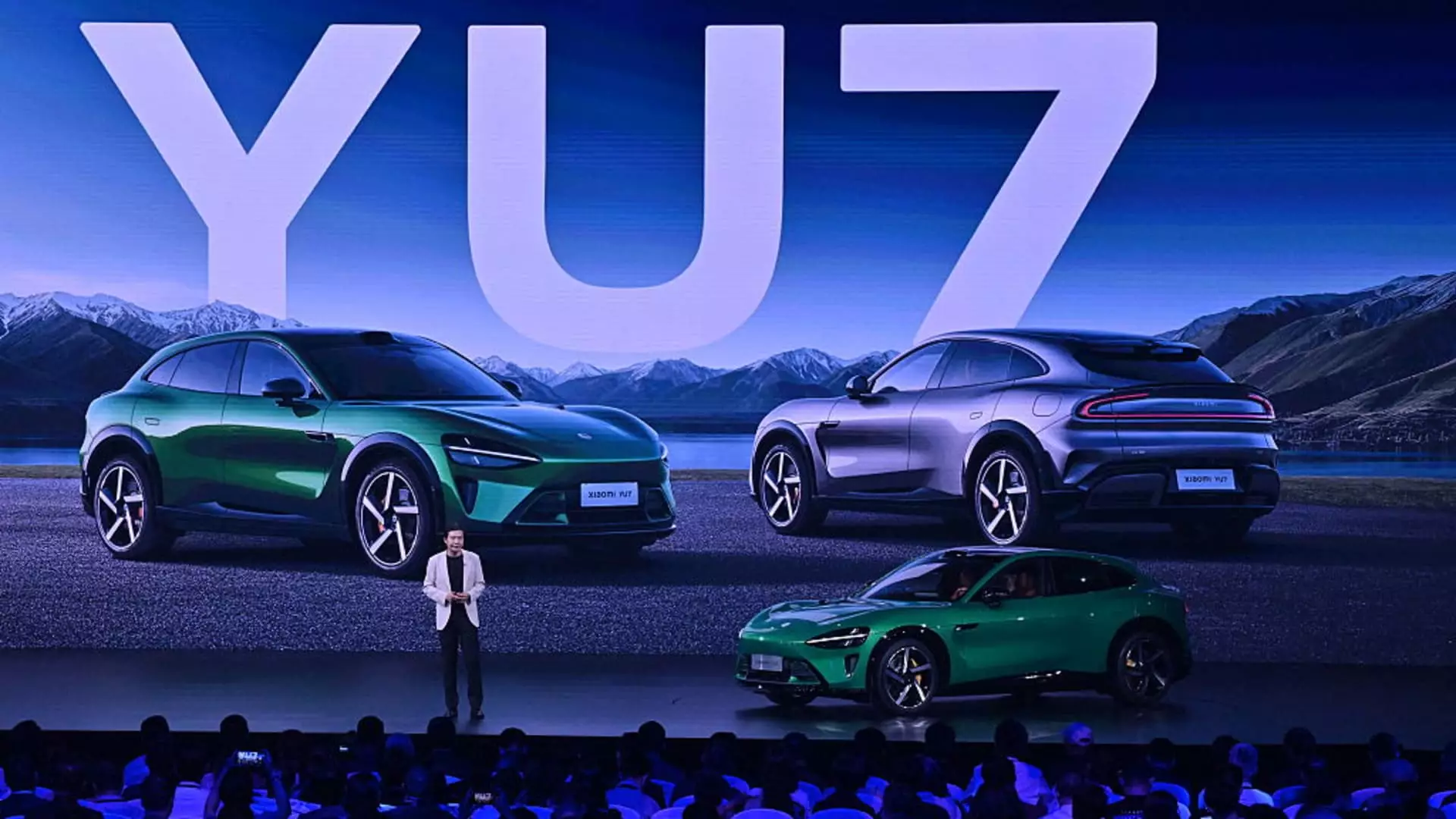In the ever-evolving landscape of electric vehicles (EVs), competition is fiercer than ever. Enter Xiaomi, a brand historically synonymous with affordable smartphones, which is now diversifying its portfolio with the introduction of the YU7 SUV. This ambitious move sets the stage for a dramatic showdown with industry giant Tesla, whose Model Y has amassed a significant following in China. Xiaomi’s arrival in the EV arena marks a pivotal moment—especially given the announcement that the YU7 boasts an impressive driving range of 760 kilometers, surpassing Tesla’s advertised range of 719 kilometers. This specification alone could reshape consumer perceptions and purchasing decisions.
Driving Range: A Game-Changer for Hedging Consumer Concerns
For consumers delving into the electric vehicle market, range anxiety is a legitimate concern that has led to hesitations regarding adoption. Companies that can effectively address this are in a prime position to capture market share. Xiaomi’s YU7 directly confronts this issue, offering a robust driving range that puts Tesla under pressure. Analysts from Citi have emphasized that they anticipate the YU7 will significantly erode Tesla’s market share within China. The staggering 30,000 units expected for monthly sales, and a forecast of up to 360,000 units annually, is no small feat. The implications here are significant; if Xiaomi successfully meets or exceeds these projections, we may witness a substantial shift in consumer loyalty and preferences.
Pricing Strategy: Underpricing the Competition?
Positioning itself strategically within the competitive pricing landscape, Xiaomi is set to price the YU7 between 250,000 yuan and 320,000 yuan (approximately $34,700 to $44,420). This pricing directly aligns it with Tesla’s Model Y, which starts at 263,500 yuan. By entering the EV market with a compelling offering at a competitive price, Xiaomi is masterfully leveraging its brand’s reputation for value. This affordability, combined with superior specifications, creates a fearsome juxtaposition against Tesla. In a market where every yuan matters, price sensitivity could become a significant differentiator, persuading buyers who may have previously leaned towards Tesla to reconsider.
Tracking the Competition: BYD and Others
While Xiaomi’s entry into the electric vehicle market is a noteworthy development, it’s essential to recognize the existing competition. As reported by Autohome, BYD’s Seagull has dominated sales as the most affordable EV, while Tesla’s Model Y remains a strong contender. Yet, with Xiaomi’s successful prior launches, such as the SU7 sedan, which also outperformed expectations despite a recent hiccup in marketing following a tragic incident involving the vehicle, the brand’s momentum is palpable. Analysts predict that the positioning of the YU7 as a “luxury SUV” can potentially elevate its standing. Xiaomi can tap into the consumer desire for prestige, often associated with luxury-priced vehicles, while still appealing to customers looking for practicality.
Innovation and Brand Identity: Xiaomi’s Integrated Ecosystem
It cannot be overlooked that Xiaomi is expertly weaving its burgeoning automotive ambitions into its established technology ecosystem. The company’s reputation for integrating exceptional tech—such as their new smartphone chips—into user-friendly products is a powerful narrative. By embedding advanced driver-assist features and unique technology within the YU7, Xiaomi is not just selling a car; it’s selling an experience. This approach capitalizes on their existing user base who already buy into the brand’s vision of smart living. It’s an innovative strategy that may very well sway tech-savvy consumers towards making an electric vehicle purchase.
The Future of the EV Market: Predictions and Possibilities
As we stand at this juncture in the EV market, there’s no denying that Xiaomi’s YU7 has the potential to disrupt the status quo. With analysts speculating on a bleak future for established players like Tesla in the Chinese market, the dynamics are shifting rapidly. The ability to balance range, price, and innovative features presents Xiaomi with a unique opportunity. If successful, Xiaomi won’t just be another player in the arena; it could very well redefine the rules of engagement and catalyze a new chapter in the electric vehicle revolution. The outcome is far from certain, but one thing is clear: the game is on, and the stakes have never been higher.

